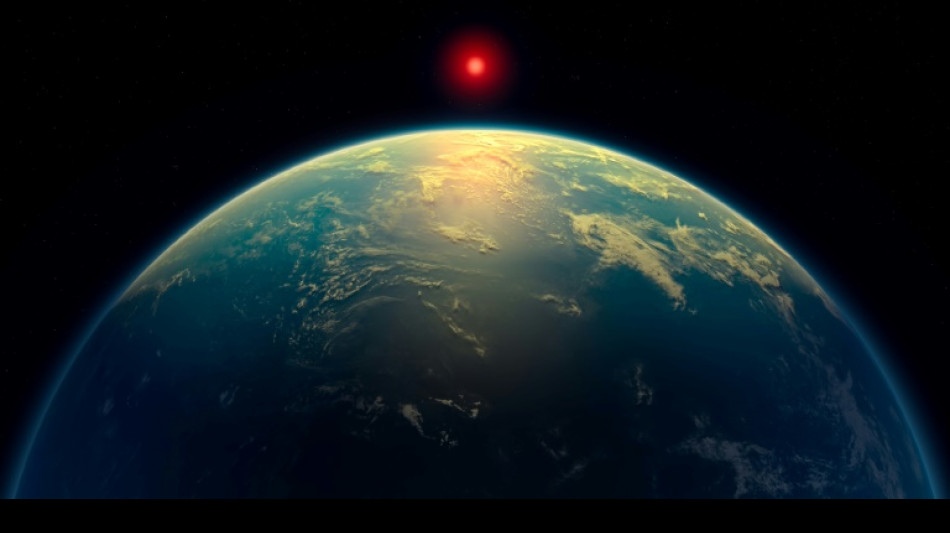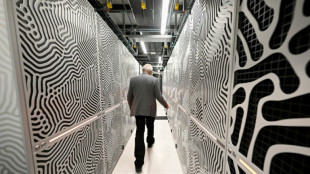
-
 Japa's Miura and Kihara capture Skate America pairs gold
Japa's Miura and Kihara capture Skate America pairs gold
-
Who can qualify for 2026 World Cup in final round of European qualifiers

-
 UK to cut protections for refugees under asylum 'overhaul'
UK to cut protections for refugees under asylum 'overhaul'
-
England's Tuchel plays down records before final World Cup qualifier

-
 Depoortere double helps France hold off spirited Fiji
Depoortere double helps France hold off spirited Fiji
-
Scotland face World Cup shootout against Denmark after Greece defeat

-
 Hansen hat-trick inspires Irish to record win over Australia
Hansen hat-trick inspires Irish to record win over Australia
-
Alcaraz secures ATP Finals showdown with 'favourite' Sinner

-
 UK to cut protections for refugees under asylum 'overhaul': govt
UK to cut protections for refugees under asylum 'overhaul': govt
-
Spain, Switzerland on World Cup brink as Belgium also made to wait

-
 Sweden's Grant leads by one at LPGA Annika tournament
Sweden's Grant leads by one at LPGA Annika tournament
-
Scotland cling to hopes of automatic World Cup qualification despite Greece defeat

-
 Alcaraz secures ATP Finals showdown with great rival Sinner
Alcaraz secures ATP Finals showdown with great rival Sinner
-
England captain Itoje savours 'special' New Zealand win

-
 Wales's Evans denies Japan historic win with last-gasp penalty
Wales's Evans denies Japan historic win with last-gasp penalty
-
Zelensky renews calls for more air defence after deadly strike on Kyiv

-
 NBA's struggling Pelicans sack coach Willie Green
NBA's struggling Pelicans sack coach Willie Green
-
Petain tribute comments raise 'revisionist' storm in France

-
 Spain on World Cup brink as Belgium also made to wait
Spain on World Cup brink as Belgium also made to wait
-
Spain virtually seal World Cup qualification in Georgia romp

-
 M23, DR Congo sign new peace roadmap in Doha
M23, DR Congo sign new peace roadmap in Doha
-
Estevao, Casemiro on target for Brazil in Senegal win

-
 Ford steers England to rare win over New Zealand
Ford steers England to rare win over New Zealand
-
Massive march in Brazil marks first big UN climate protest in years

-
 Spain rescues hundreds of exotic animals from unlicensed shelter
Spain rescues hundreds of exotic animals from unlicensed shelter
-
Huge fire sparked by explosions near Argentine capital 'contained'

-
 South Africa defy early red card to beat battling Italy
South Africa defy early red card to beat battling Italy
-
Sinner beats De Minaur to reach ATP Finals title match

-
 Zelensky vows overhaul of Ukraine's scandal-hit energy firms
Zelensky vows overhaul of Ukraine's scandal-hit energy firms
-
South Africa defy early red card to beat Italy

-
 Alex Marquez claims Valencia MotoGP sprint victory
Alex Marquez claims Valencia MotoGP sprint victory
-
McIlroy shares lead with Race to Dubai title in sight

-
 Climate protesters rally in Brazil at COP30 halfway mark
Climate protesters rally in Brazil at COP30 halfway mark
-
Spike Lee gifts pope Knicks jersey as pontiff meets film stars

-
 BBC caught in crossfire of polarised political and media landscape
BBC caught in crossfire of polarised political and media landscape
-
'Happy' Shiffrin dominates in Levi slalom for 102nd World Cup win

-
 Palestinian national team on 'mission' for peace in Spain visit
Palestinian national team on 'mission' for peace in Spain visit
-
Brazilian 'Superman' cheers child cancer patients in Ghana

-
 India close in on win over South Africa after Jadeja heroics
India close in on win over South Africa after Jadeja heroics
-
Huge explosions rock industrial area near Argentina's capital

-
 Bezzecchi takes pole for Valencia sprint and MotoGP
Bezzecchi takes pole for Valencia sprint and MotoGP
-
Dominant Shiffrin leads after first slalom run in Levi

-
 Nine killed in accidental explosion at Indian Kashmir police station
Nine killed in accidental explosion at Indian Kashmir police station
-
Climate protesters to rally at COP30's halfway mark

-
 Fighting South Africa lose Rickelton after India 189 all out
Fighting South Africa lose Rickelton after India 189 all out
-
Harmer leads South Africa fightback as India 189 all out

-
 Prison looms for Brazil's Bolsonaro after court rejects his appeal
Prison looms for Brazil's Bolsonaro after court rejects his appeal
-
EU bows to pressure on loosening AI, privacy rules

-
 India close in on lead despite South African strikes
India close in on lead despite South African strikes
-
Curry's 49 points propel Warriors in 109-108 win over Spurs


Strongest 'hints' yet of life detected on distant planet
Astronomers announced Thursday that they had detected the most promising "hints" of potential life on a planet beyond our solar system, though other scientists expressed scepticism.
There has been vigorous debate in scientific circles about whether the planet K2-18b, which is 124 light years away in the Leo constellation, could be an ocean world capable of hosting microbial life, at least.
Using the James Webb Space Telescope, a British-US team of researchers detected signs of two chemicals in the planet's atmosphere long considered to be "biosignatures" indicating extraterrestrial life.
On Earth, the chemicals dimethyl sulfide (DMS) and dimethyl disulfide are produced only by life, mostly microscopic marine algae called phytoplankton.
The researchers emphasised caution, saying that more observations were needed to confirm these findings, and that they were not announcing a definitive discovery.
But the implications could be huge, according to Nikku Madhusudhan, a Cambridge University astrophysicist and lead author of the study, published in The Astrophysical Journal Letters.
"What we are finding at this point are hints of possible biological activity outside the solar system," he told journalists.
"Frankly, I think this is the closest we have come to seeing a feature that we can attribute to life."
But outside experts pointed to disputes over previous discoveries about the exoplanet, adding that these chemicals could have been created by unknown means having nothing to do with life.
- Chemical clues -
More than eight times the mass of Earth and 2.5 times as big, K2-18b is rare among the roughly 6,000 exoplanets discovered so far in that it orbits its star in a habitable or "goldilocks" zone.
This means it is neither too hot nor too cold to have liquid water, considered the most important ingredient for life.
Telescopes observe such far-off exoplanets when they cross in front of their star, allowing astronomers to analyse how molecules block the light streaming through their atmosphere.
In 2023, the Webb telescope detected methane and carbon dioxide in K2-18b's atmosphere, the first time such carbon-based molecules were detected on an exoplanet in a habitable zone.
It also detected weak signals of the chemical DMS, leading astronomers to turn Webb towards the planet again a year ago, this time using its mid-infrared instrument to detect different wavelengths of light.
They found much stronger signs of the chemicals, though still well below the "five sigma" threshold of statistical significance scientists seek for such discoveries.
Even if the results are confirmed, it would not necessarily mean that the planet is home to life.
Last year, scientists found traces of DMS on a comet, which suggested it can be produced in non-organic ways and is perhaps not a "biosignature".
However the concentration of the chemical observed on K2-18b appears to be thousands of times stronger than levels on Earth, likely suggesting a biological origin, Madhusudhan said.
- Are we alone in the universe? -
K2-18b has long been considered the premier candidate for a "hycean planet" -- an ocean world bigger than Earth with a hydrogen-rich atmosphere.
These planets would not be expected to be home to intelligent alien life, but rather tiny microbes similar to those in Earth's oceans billions of years ago.
Some research has questioned whether the currently proposed hycean planets are too close to their stars to support liquid water -- including K2-18b, which orbits its star every 33 days.
Raymond Pierrehumbert, a planetary physics professor at Oxford University, has conducted separate research indicating K2-18b is too hot for life.
If the planet did have water, it would be "hellishly hot" and uninhabitable, he told AFP, adding that oceans of lava were more plausible.
Sara Seager, a professor of planetary science at MIT, called for patience, pointing to previous claims of water vapour in K2-18b's atmosphere that turned out to be a different gas.
Madhusudhan estimated that it would take just 16 to 24 more hours of Webb's time to reach the five-sigma threshold, which could happen in the next few years.
The current three-sigma is comparable to the odds of flipping a coin 10 times and getting the same result each time, Cambridge University statistician Stephen Burgess explained.
Five sigma would be getting that result after 20 flips, and would mean "we can be very confident that this observation isn't just a chance finding," he said.
Even beyond K2-18b, Madhusudhan said Webb and future telescopes could allow humanity to discover life outside our home planet sooner than one might think.
"This could be the tipping point, where suddenly the fundamental question of whether we're alone in the universe is one we're capable of answering," he said.
I.Saadi--SF-PST




